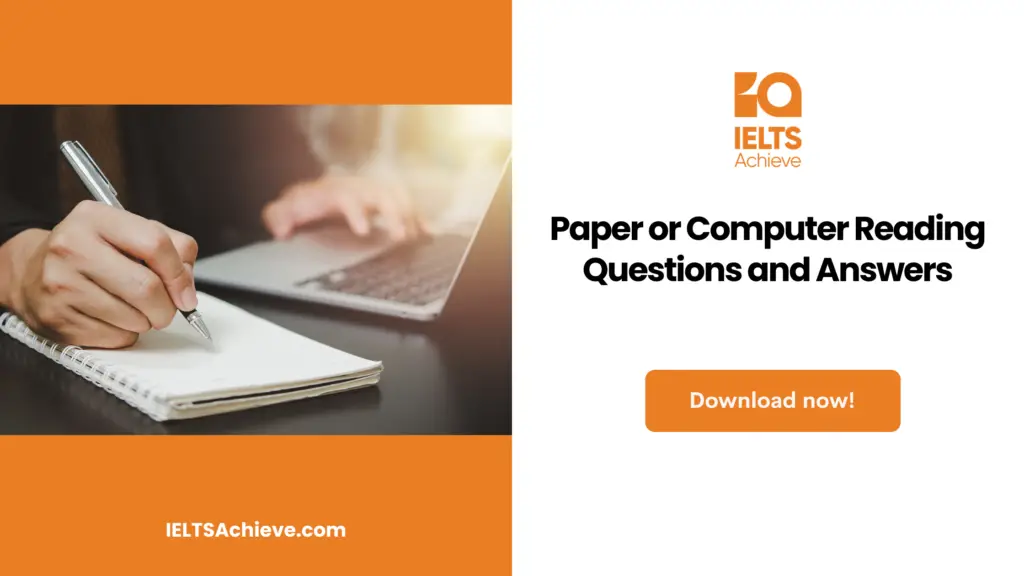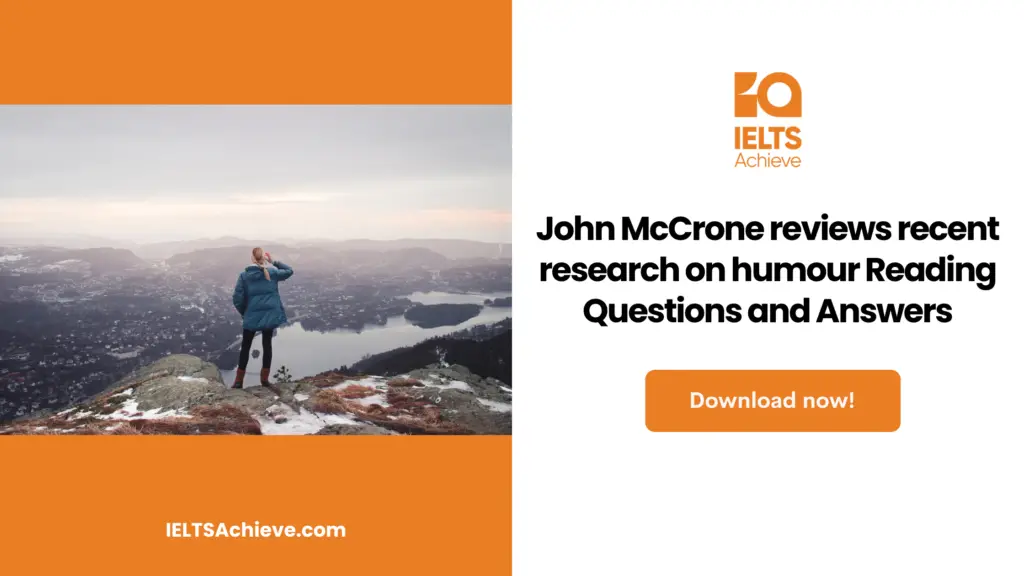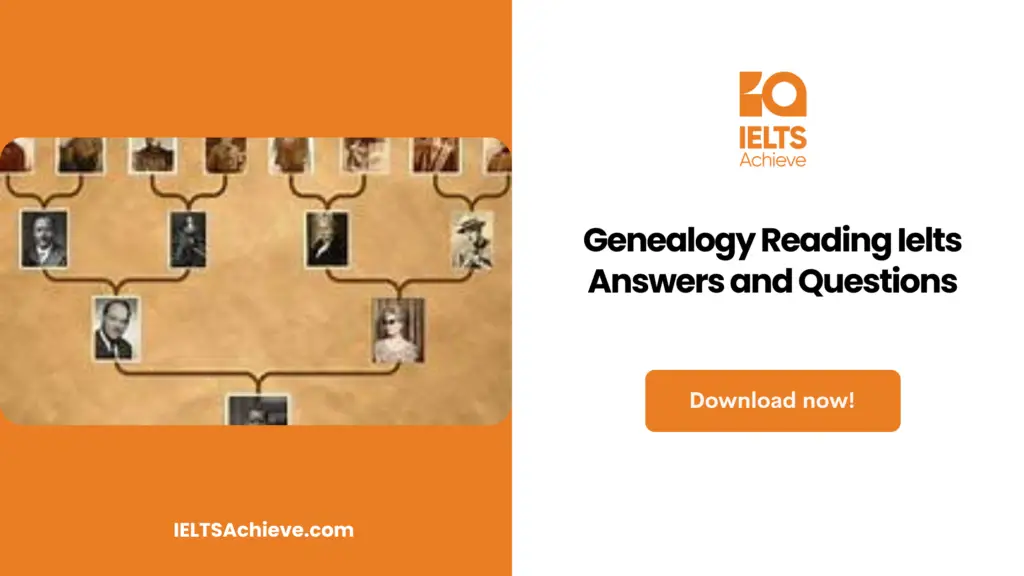The Blog post contains the following IELTS Reading Questions:
- IELTS Reading Matching Heading.
- IELTS Reading Summary Completion.
- IELTS Reading Multiple Choice Questions.
Stay informed and prepared for success – Explore our comprehensive Reading Test Info page to get valuable insights, exam format details, and expert tips for mastering the IELTS Reading section.
IELTS Reading Passage – Paper or Computer

Paper or Computer
A. The intention was to replace paper with computer technology. But it has not occurred. Every Western nation currently uses more paper per capita than they did five years ago. Between 1995 and 2000, the use of uncoated free-sheet paper, the most popular type of office paper, climbed by almost 15% in the United States. This is generally regarded as evidence of how difficult it is to change ingrained, wasteful habits and how steadfastly we fight the efficiencies brought by computerization. Several ergonomics experts and cognitive psychologists, however, disagree. They argue that paper has lasted for good reason, as it has numerous advantages over computers when it comes to completing certain types of cognitive tasks. People are fundamentally confused about the role that paper plays in our lives, as seen by their shock at the sight of a cluttered workstation and their enjoyment at the sight of air traffic controllers tracking aircraft using handwritten notes on paper strips.
B. Written by two social scientists, Abigail Sellen and Richard Harper, The Myth of the Paperless Office presents a compelling argument for paper. At the beginning of their book, they discuss a research they did at the International Monetary Fund in Washington, D.C. Economists at the IMF spend the majority of their time generating studies on complex economic topics, an activity that seems ideally suited for computerization. Sellen and Harper were nonetheless curious as to why the IMF was overflowing with paper. At the I.M.F., drafting reports is a highly collaborative process involving the experience and input of multiple individuals. Economists bring draught reports into conference rooms, where they lay out the relevant pages and discuss adjustments. As they return to their workplaces and jot notes in the margin, they take advantage of the freedom given by the informality of the handwritten remark. They then show the amended draft to the author in person and lead him through the suggested page-by-page changes. The author then arranges all the papers with remarks on his desk and enters them into the computer, rearranging the pages as he goes, organising and reorganising, saving and rejecting.
C. Without paper, this method of collaborative and iterative production would be substantially more difficult. According to Sellen and Harper, paper offers a unique collection of “affordances,” or features that enable specific uses. Paper is tangible; we can take up a piece of text, turn the pages, read excerpts, and immediately have a feeling of what it is. Paper is spatially adaptable, so we can lay it out and organise it as we see fit. In addition, it is tailorable; we can annotate and offer comments as we read without altering the original text. Naturally, digital documents have their own advantages. They are easy to find, share, save, access remotely, and link to other relevant information. However, they lack the features necessary for a group of people to collaborate on a report, according to Sellen and Harper.
D. Paper makes it possible to think in a certain way. Take the top of your desk as an example. You probably have a keyboard, a computer screen, and a clear 18-inch-square area in front of your chair. Most likely, the rest of the desk is filled with stacks of papers, journals, magazines, binders, postcards, videotapes, and other things from the knowledge economy. Even though the stacks look like they are a mess, they are not. Apple Computer did some research a few years ago that showed that even the most disorganised piles make sense to the person who made them. They also found that office workers could talk at length about where their piles came from and what they meant. For example, the pile closest to the newly freed 18-inch-square work area usually has the most important and urgent work, and the most important document is usually on top of that pile. The piles are working records. Over time, they get mixed up and rearranged, sometimes in a chronological order, sometimes by theme, and sometimes in both ways. Files can include physical clues about certain documents, like stacking a certain piece of paper in a certain way
E. Nevertheless, why do we stack documents instead of filing them? As a result of the fact that heaps represent continual, active cognition. Sellen and Harper rely heavily on the work of psychologist Alison Kidd to support their assertion that “knowledge workers” use the physical space of the desktop to store “ideas that they cannot yet categorise or even decide how they might use.” A dirty desk is not necessarily a symptom of disorganisation. The inability to organise the papers on their desks because they have not yet organised the ideas in their heads may be a sign of complexity for persons who deal with a multitude of unresolved notions simultaneously. When they come to work on Monday or when a phone call interrupts their job, many of the individuals with whom Kidd spoke use the papers on their desks as contextual cues to retrieve a complicated collection of threads quickly and easily. The stacks of documents on our desks represent, in a sense, the contents of our minds.
F. This view that paper serves a highly specialised cognitive and social function is a radical departure from the conventional understanding of the material. Late in the nineteenth century, as part of the move to “systems administration,” paper began to flourish in the workplace. To deal with the complexities of the industrial economy, managers created company-wide reporting standards and demanded monthly, weekly, or even daily reports from their staff. Consequently, a monthly sales report, an office manual, and a company newsletter were all prepared. The discovery of the typewriter in the 1880s, which allowed individuals to print papers in a fraction of the time previously necessary, was swiftly followed by the creation of carbon paper, which enabled typists to produce ten copies of a document simultaneously. Paper was essential as a means of control rather than as a catalyst for innovative collaboration and thought.
Unlock your full potential in the IELTS Reading section – Visit our IELTS Reading Practice Question Answer page now!
Recommended Questions:
Renewable Energy IELTS Reading Question with Answer
Questions 1 – 6
The reading passage has seven paragraphs, A-F
Choose the correct heading for paragraphs A-F from the list below. Write the correct number, i-xi, in boxes 1-6 on your answer sheet.
List of Headings
i. Failure resulting from the absence of paper records.
ii. Stacks can be more motivating than disorganised.
iii. Overview of an unforeseen occurrence: paper survived
iv. The paperless workplace of the IMF appeared to be a waste of paper.
v. Paper continued as a need for sharing or managing
vi. There are benefits to using paper in offices.
vii. People’s mental qualities are reflected in their piles.
viii. In a favourable circumstance, economists used paper pages.
ix. The delight of having the paper square before the computer
x. Comparison of the productivity of utilising paper against the computer
- Paragraph A
- Paragraph B
- Paragraph C
- Paragraph D
- Paragraph E
- Paragraph F
Ready to conquer Matching Headings questions? Click here to learn essential tips and techniques for matching headings accurately to paragraphs or sections in the IELTS Reading section.
Questions 7–10
Use No More Than Three Words from the Reading Passage for each response as you summarise the following paragraphs from the passage. Fill in the boxes 7 to 10 on your answer sheet with your responses.
Paper documents have a number of benefits over digital ones. Initially, it permits clerks to operate in a 7______ way among colleagues. Additionally, paper is not like virtual digital counterparts; instead, it’s 8 ______. Finally, because it is 9 ______ Notes or remarks can be easily inserted as pertinent information. However, a deficiency occurs when there is no convenience on the task, which is for a 10 _______ .
Boost your performance in Summary, Notes, Table, and Flowchart Completion tasks. Click here to explore our detailed guide and learn how to effectively complete summaries, notes, tables, and flowcharts in the IELTS Reading section.
Questions 11-14
Choose the correct letter, A, B, C or D.
Write your answers in boxes 11-14 on your answer sheet.
11. The chapter makes reference to “Piles,” but what does that mean?
A. They are operating under instructions
B. They are obviously chaotic.
C. They are all in chronological order.
D. The names are listed alphabetically
12. What do the IMF economists have to say about their style of document writing?
A. They make notes on their thoughts regarding the draughts’ freedom
B. They each complete their own writing.
C. Before an electronic version was created, they exchange ideas
D. They entirely rely on the electronic version
13. The passage’s conclusion states that paper will not be replaced by electronic vision; why?
A. Paper is a cheap purchase.
B. It aided Western countries’ management theories.
C. It takes time for people to break old habits.
D. It facilitates collaboration and is practical for managing and implementing projects.
14. What about a sophisticated economy does the management believe in?
A. Management tool could be recorded paper
B. Using carbon paper should be required
C. The most crucial factor is teamwork
D. The best method is a monthly report
Ready to improve your performance in Multiple Choice Questions (MCQs)? Click here to access our comprehensive guide on how to tackle MCQs effectively in the IELTS Reading section.
Unlock your full potential in the IELTS Reading section – Visit our IELTS Reading Practice Question Answer page now!
Recommended Questions:
Renewable Energy IELTS Reading Question with Answer
Answers
1.iv
2. iii
3. Viii
4. ii
5. ix
6. i
7. Collaborative and iterative
8. Tangible
9. Tailorable
10. Group Of people
11. A
12. C
13. D
14. A

We hope you found this post useful in helping you to study for the IELTS Test. If you have any questions please let us know in the comments below or on the Facebook page.
The best way to keep up to date with posts like this is to like us on Facebook, then follow us on Instagram and Pinterest. If you need help preparing for the IELTS Test, join the IELTS Achieve Academy and see how we can assist you to achieve your desired band score. We offer an essay correction service, mock exams and online courses.

